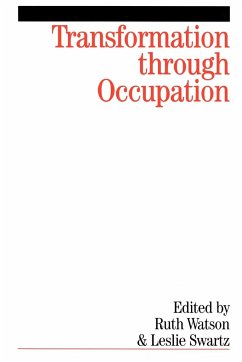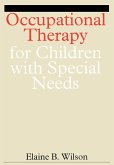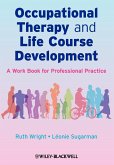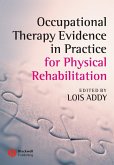- Broschiertes Buch
- Merkliste
- Auf die Merkliste
- Bewerten Bewerten
- Teilen
- Produkt teilen
- Produkterinnerung
- Produkterinnerung
This book is based on learning grounded in actual experience and introduces the perspective of practice orientated to developing, rather than developed, contexts. The focus remains on the ordinary things that people do on a daily basis and how this impacts their health, well-being and total existence. Examples are provided of the writers' professional beliefs, values and convictions in action.
Andere Kunden interessierten sich auch für
![Occupational Therapy for Children with Special Needs Occupational Therapy for Children with Special Needs]() Elaine WilsonOccupational Therapy for Children with Special Needs85,99 €
Elaine WilsonOccupational Therapy for Children with Special Needs85,99 €![Occupation Analysis in Practice Occupation Analysis in Practice]() Occupation Analysis in Practice68,99 €
Occupation Analysis in Practice68,99 €![Politics of Occupation-Centred Practice Politics of Occupation-Centred Practice]() Politics of Occupation-Centred Practice61,99 €
Politics of Occupation-Centred Practice61,99 €![Occupational Therapy and Life Course Development Occupational Therapy and Life Course Development]() Ruth WrightOccupational Therapy and Life Course Development68,99 €
Ruth WrightOccupational Therapy and Life Course Development68,99 €![Occupational Therapy and Vocational Occupational Therapy and Vocational]() Joanne RossOccupational Therapy and Vocational78,99 €
Joanne RossOccupational Therapy and Vocational78,99 €![Occupational Therapy Evidence in Practice for Physical Rehabilitation Occupational Therapy Evidence in Practice for Physical Rehabilitation]() Lois AddyOccupational Therapy Evidence in Practice for Physical Rehabilitation72,99 €
Lois AddyOccupational Therapy Evidence in Practice for Physical Rehabilitation72,99 €![Occupational Therapy with Older People Occupational Therapy with Older People]() Gail MountainOccupational Therapy with Older People85,99 €
Gail MountainOccupational Therapy with Older People85,99 €-
-
-
This book is based on learning grounded in actual experience and introduces the perspective of practice orientated to developing, rather than developed, contexts. The focus remains on the ordinary things that people do on a daily basis and how this impacts their health, well-being and total existence. Examples are provided of the writers' professional beliefs, values and convictions in action.
Hinweis: Dieser Artikel kann nur an eine deutsche Lieferadresse ausgeliefert werden.
Hinweis: Dieser Artikel kann nur an eine deutsche Lieferadresse ausgeliefert werden.
Produktdetails
- Produktdetails
- Verlag: Wiley
- Seitenzahl: 346
- Erscheinungstermin: 16. April 2004
- Englisch
- Abmessung: 229mm x 152mm x 19mm
- Gewicht: 505g
- ISBN-13: 9781861564252
- ISBN-10: 1861564252
- Artikelnr.: 22787537
- Herstellerkennzeichnung
- Libri GmbH
- Europaallee 1
- 36244 Bad Hersfeld
- gpsr@libri.de
- Verlag: Wiley
- Seitenzahl: 346
- Erscheinungstermin: 16. April 2004
- Englisch
- Abmessung: 229mm x 152mm x 19mm
- Gewicht: 505g
- ISBN-13: 9781861564252
- ISBN-10: 1861564252
- Artikelnr.: 22787537
- Herstellerkennzeichnung
- Libri GmbH
- Europaallee 1
- 36244 Bad Hersfeld
- gpsr@libri.de
Ruth Watson and Leslie Swartz are the authors of Transformation Through Occupation: Human Occupation in Context, published by Wiley.
Contributors.
Acknowledgements.
Foreword.
Appendix Part One Construct and context.
Chapter 1 New horizons in occupational therapy - Ruth Watson.
Chapter 2 Occupation and occupational therapy - Ruth Watson and Marion
Fourie.
Chapter 3 International and African Influences on occupational therapy -
Ruth Watson and Marion Fourie.
Chapter 4 A population approach to transformation - Ruth Watson.
Part Two Contextual issues that impact on occupations.
Chapter 5 The impact of pverty: potential lost - Marion Fourie, Roshan
Galvaan and Hilary Beeton.
Chapter 6 Equalizing opportunities for occupational engagement: disabled
women's stories - Theresa Lorenzo.
Chapter 7 Women empowered through occuopation: from deprivation to realized
potential - Ruth Watson and Kashifa Lagerdien.
Chapter 8 Fathers with HIV/AIDS: the struggle for occupation - Zela Coetzee
and Leslie Swartz.
Chapter 9 Occupation in the criminal justice system - Madeleine Duncan.
Chapter 10 Psychiatric disbility in the world of work: shifts in attitude
and service models - Lana van Niekerk.
Chapter 11 Taking account of spirituality - Karin Weskamp and Elelwani L.
Ramugondo.
Part Three Service Implications and occupation in action.
Chapter 12 Play and playfulness: children living with HIV/AIDS - Elelwani
L. Ramugondo
Chapter 13 Engaging with youth at risk - Roshan Galvaan .
Chapter 14 Promoting mental health through occupation - Madeleine Duncan.
Chapter 15 Trauma, violence and occupation - Madeleine Duncan.
Chapter 16 Grandmothers affected by HIV/AIDS: new roles and occupations -
Kathleen Brodrick.
Chapter 17Care as vocation and occupation - Craig Higson-Smith, Linda
Richter and Miriam Altman.
Chapter 18 Promoting occupations in rural communities - Theresa :premzo and
Lizahn Cloete.
Part Four The challenge of transformation.
Chapter 19 Rethinking professional ethics - Leslie Swartz.
Chapter 20 Transformation through occupation: towards a prototype -
Madeleine Duncan and Ruth Watson.
Index.
Acknowledgements.
Foreword.
Appendix Part One Construct and context.
Chapter 1 New horizons in occupational therapy - Ruth Watson.
Chapter 2 Occupation and occupational therapy - Ruth Watson and Marion
Fourie.
Chapter 3 International and African Influences on occupational therapy -
Ruth Watson and Marion Fourie.
Chapter 4 A population approach to transformation - Ruth Watson.
Part Two Contextual issues that impact on occupations.
Chapter 5 The impact of pverty: potential lost - Marion Fourie, Roshan
Galvaan and Hilary Beeton.
Chapter 6 Equalizing opportunities for occupational engagement: disabled
women's stories - Theresa Lorenzo.
Chapter 7 Women empowered through occuopation: from deprivation to realized
potential - Ruth Watson and Kashifa Lagerdien.
Chapter 8 Fathers with HIV/AIDS: the struggle for occupation - Zela Coetzee
and Leslie Swartz.
Chapter 9 Occupation in the criminal justice system - Madeleine Duncan.
Chapter 10 Psychiatric disbility in the world of work: shifts in attitude
and service models - Lana van Niekerk.
Chapter 11 Taking account of spirituality - Karin Weskamp and Elelwani L.
Ramugondo.
Part Three Service Implications and occupation in action.
Chapter 12 Play and playfulness: children living with HIV/AIDS - Elelwani
L. Ramugondo
Chapter 13 Engaging with youth at risk - Roshan Galvaan .
Chapter 14 Promoting mental health through occupation - Madeleine Duncan.
Chapter 15 Trauma, violence and occupation - Madeleine Duncan.
Chapter 16 Grandmothers affected by HIV/AIDS: new roles and occupations -
Kathleen Brodrick.
Chapter 17Care as vocation and occupation - Craig Higson-Smith, Linda
Richter and Miriam Altman.
Chapter 18 Promoting occupations in rural communities - Theresa :premzo and
Lizahn Cloete.
Part Four The challenge of transformation.
Chapter 19 Rethinking professional ethics - Leslie Swartz.
Chapter 20 Transformation through occupation: towards a prototype -
Madeleine Duncan and Ruth Watson.
Index.
Contributors.
Acknowledgements.
Foreword.
Appendix Part One Construct and context.
Chapter 1 New horizons in occupational therapy - Ruth Watson.
Chapter 2 Occupation and occupational therapy - Ruth Watson and Marion
Fourie.
Chapter 3 International and African Influences on occupational therapy -
Ruth Watson and Marion Fourie.
Chapter 4 A population approach to transformation - Ruth Watson.
Part Two Contextual issues that impact on occupations.
Chapter 5 The impact of pverty: potential lost - Marion Fourie, Roshan
Galvaan and Hilary Beeton.
Chapter 6 Equalizing opportunities for occupational engagement: disabled
women's stories - Theresa Lorenzo.
Chapter 7 Women empowered through occuopation: from deprivation to realized
potential - Ruth Watson and Kashifa Lagerdien.
Chapter 8 Fathers with HIV/AIDS: the struggle for occupation - Zela Coetzee
and Leslie Swartz.
Chapter 9 Occupation in the criminal justice system - Madeleine Duncan.
Chapter 10 Psychiatric disbility in the world of work: shifts in attitude
and service models - Lana van Niekerk.
Chapter 11 Taking account of spirituality - Karin Weskamp and Elelwani L.
Ramugondo.
Part Three Service Implications and occupation in action.
Chapter 12 Play and playfulness: children living with HIV/AIDS - Elelwani
L. Ramugondo
Chapter 13 Engaging with youth at risk - Roshan Galvaan .
Chapter 14 Promoting mental health through occupation - Madeleine Duncan.
Chapter 15 Trauma, violence and occupation - Madeleine Duncan.
Chapter 16 Grandmothers affected by HIV/AIDS: new roles and occupations -
Kathleen Brodrick.
Chapter 17Care as vocation and occupation - Craig Higson-Smith, Linda
Richter and Miriam Altman.
Chapter 18 Promoting occupations in rural communities - Theresa :premzo and
Lizahn Cloete.
Part Four The challenge of transformation.
Chapter 19 Rethinking professional ethics - Leslie Swartz.
Chapter 20 Transformation through occupation: towards a prototype -
Madeleine Duncan and Ruth Watson.
Index.
Acknowledgements.
Foreword.
Appendix Part One Construct and context.
Chapter 1 New horizons in occupational therapy - Ruth Watson.
Chapter 2 Occupation and occupational therapy - Ruth Watson and Marion
Fourie.
Chapter 3 International and African Influences on occupational therapy -
Ruth Watson and Marion Fourie.
Chapter 4 A population approach to transformation - Ruth Watson.
Part Two Contextual issues that impact on occupations.
Chapter 5 The impact of pverty: potential lost - Marion Fourie, Roshan
Galvaan and Hilary Beeton.
Chapter 6 Equalizing opportunities for occupational engagement: disabled
women's stories - Theresa Lorenzo.
Chapter 7 Women empowered through occuopation: from deprivation to realized
potential - Ruth Watson and Kashifa Lagerdien.
Chapter 8 Fathers with HIV/AIDS: the struggle for occupation - Zela Coetzee
and Leslie Swartz.
Chapter 9 Occupation in the criminal justice system - Madeleine Duncan.
Chapter 10 Psychiatric disbility in the world of work: shifts in attitude
and service models - Lana van Niekerk.
Chapter 11 Taking account of spirituality - Karin Weskamp and Elelwani L.
Ramugondo.
Part Three Service Implications and occupation in action.
Chapter 12 Play and playfulness: children living with HIV/AIDS - Elelwani
L. Ramugondo
Chapter 13 Engaging with youth at risk - Roshan Galvaan .
Chapter 14 Promoting mental health through occupation - Madeleine Duncan.
Chapter 15 Trauma, violence and occupation - Madeleine Duncan.
Chapter 16 Grandmothers affected by HIV/AIDS: new roles and occupations -
Kathleen Brodrick.
Chapter 17Care as vocation and occupation - Craig Higson-Smith, Linda
Richter and Miriam Altman.
Chapter 18 Promoting occupations in rural communities - Theresa :premzo and
Lizahn Cloete.
Part Four The challenge of transformation.
Chapter 19 Rethinking professional ethics - Leslie Swartz.
Chapter 20 Transformation through occupation: towards a prototype -
Madeleine Duncan and Ruth Watson.
Index.








